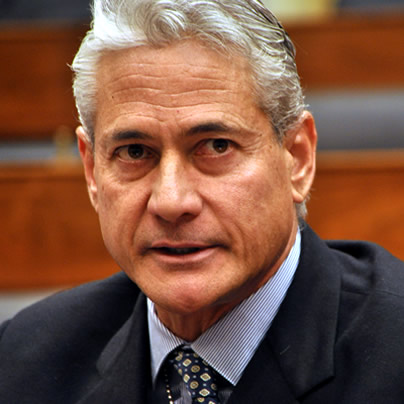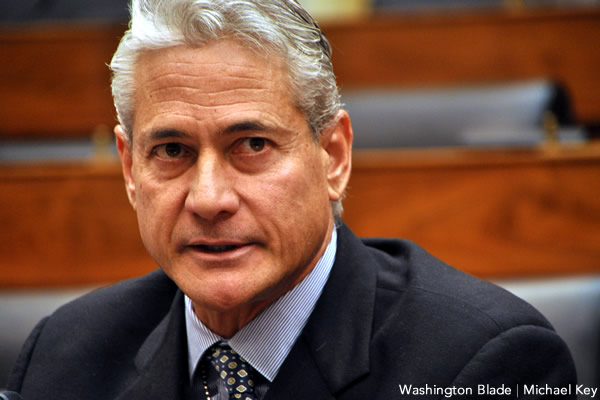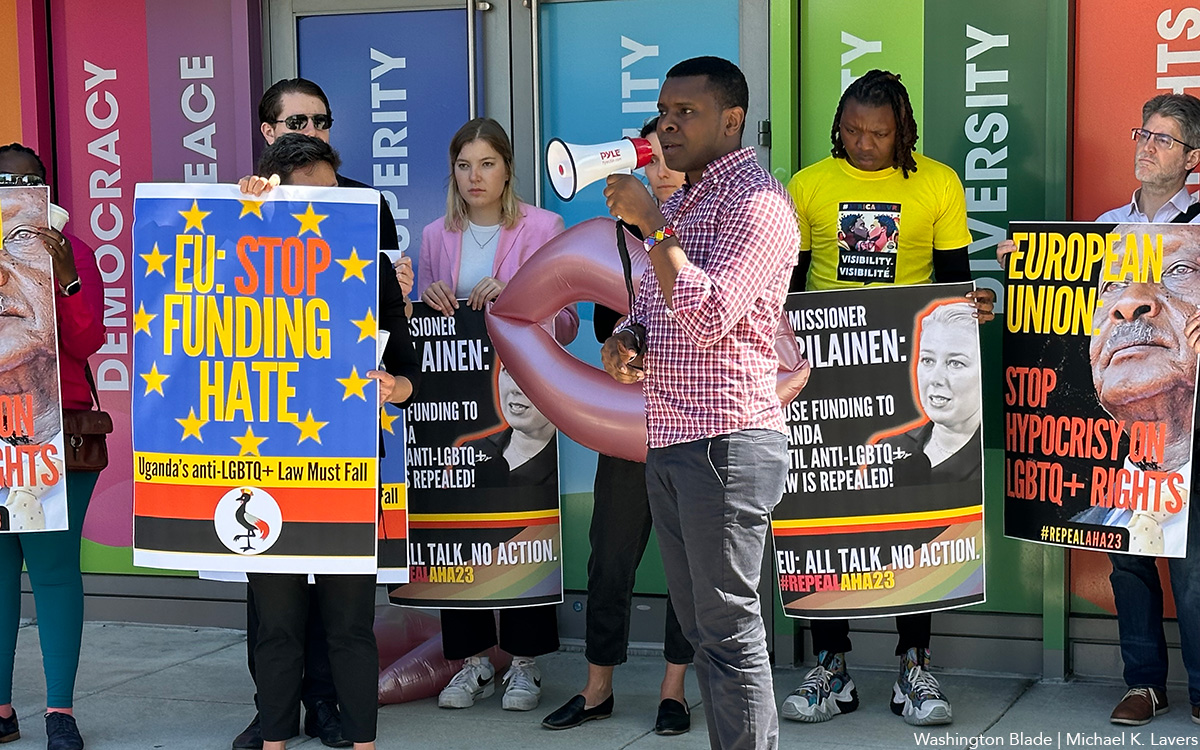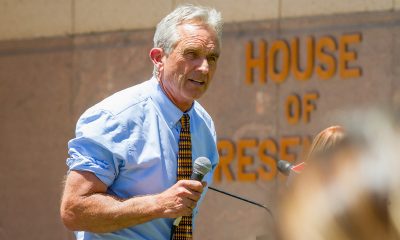News
Louganis: Russian Open Games marred by disruptions
Threats, smoke bomb, police target LGBT event


Retired Olympian Greg Louganis last December took part in a Russia briefing on Capitol Hill. (Washington Blade photo by Michael Key)
Retired Olympic diver Greg Louganis is among those who participated in the Russian Open Games that ended in Moscow on Sunday.
Louganis, who competed in a table tennis tournament during the five-day event that drew more than 300 LGBT athletes from Russia and other countries that include the U.S. and Sweden, arrived in the Russian capital early last week after he received a last-minute visa.
He left Moscow on Feb. 28.
The gay retired Olympian who won two gold medals during the 1998 Summer Olympics in Seoul and in the 1984 Summer Olympics in Los Angeles participated in a Feb. 27 press conference at a Moscow gay nightclub that opened the Russian Open Games. A bomb threat forced him and organizers to speak with reporters outside in the building’s parking lot.
The Washington Post reported the U.S. Embassy hosted a basketball game between participants and diplomats on Sunday after a smoke bomb disrupted a tournament two days earlier.
Louganis, who learned he was living with HIV six months before competing in Seoul, told the Blade police escorted him and more than 30 other Russian Open Games participants out of an ice rink on Feb. 27 after someone reported a group of “strange people” had arrived. He said they had simply gone to the rink for what he described as a “group workshop” about “teaching us some skating skills.”
“They made it clear we were not welcome,” said Louganis. “Just the looks of disdain as we were escorted off the premises was just really concerning.”
Louganis told the Blade he was sending e-mails from a coffee shop across the street from the building where the Russian LGBT Network was holding a panel after the ice rink incident when Konstantin Yablotskiy of the Russian LGBT Sport Federation, which organized the Russian Open Games, said the event had been interrupted. He said Yablotskiy told him somebody suddenly turned off the lights and told them the venue would have to close if they didn’t leave.
Louganis said Yablotskiy and Elvina Yuvakaeva of the Russian LGBT Sport Federation told only one person about venues they had secured for various competitions – and this person escorted participants to them after they met at a Metro station. Louganis told the Blade that Yablotskiy told him to take precautions that included not saying anything specific during telephone conversations because he was sure “others were listening.”
“It was a very interesting environment,” said Louganis, noting he had last been to Moscow more than a decade before the 1991 collapse of the Soviet Union. “It kind of reminded me of that; that everything was watched, was observed, scrutinized.”
The Russian Open Games took place a few days after the 2014 Winter Olympics in Sochi ended.
The Kremlin’s LGBT rights record that includes a 2013 law banning gay propaganda to minors overshadowed the Sochi games. Organizers of the Russian Open Games did not allow anyone under 18 to participate – they also included a disclaimer on its website that read “the information on this site is intended only for the use of those aged 18 and over.”
St. Petersburg Legislative Assemblyman Vitaly Milonov, who spearheaded his city’s gay propaganda ban that inspired the law Russian President Vladimir Putin signed last June, denounced the Russian Open Games. The lawmaker also urged Moscow Mayor Sergei Sobyanin to cancel the event.
Yuvakaeva last week said four venues that had initially agreed to host the games abruptly cancelled their agreements. The hotel where the Russian LGBT Network had planned to hold its forum also cancelled the scheduled event.
Louganis told the Blade he had not heard about the 10 LGBT rights advocates who were arrested near Moscow’s Red Square on Feb. 7 as they tried to sing the Russian national anthem while holding rainbow flags before the Sochi opening ceremony. He said a gay couple he met in the Russian capital told him about the arrests – and the officers who reportedly beat and threatened to sexually assault the activists while inside a local police station.
St. Petersburg police on Feb. 7 arrested Anastasia Smirnova and three other LGBT rights advocates as they tried to march with a banner in support of the campaign to add sexual orientation to the Olympic charter’s non-discrimination clause.
“I really wanted to be a participant [in the Russian Open Games] just to get an objective view rather than the propagandized vision of what it was in Sochi,” Louganis told the Blade, discussing Russia’s LGBT rights record. “Sochi I heard was wonderful and everybody was bragging and the media was over-reacting and all of this. You don’t know until you’re there.”
Louganis was also in Moscow as Russian troops prepared to take control of Ukraine’s Crimea region amid outrage from the U.S. and Europe.
The Kremlin on Monday reportedly issued an ultimatum that demanded the surrender of the crews of two Ukrainian warships on the predominantly Russian-speaking peninsula where Russia’s Black Sea Fleet is based. Secretary of State John Kerry is scheduled to arrive in the Ukrainian capital on Tuesday as tension between Washington and Moscow continues to escalate after the country’s Kremlin-backed president went into hiding following the deaths of dozens of anti-government protesters in Kiev.
“We were aware of what was going on with the borders being enforced,” said Louganis. “There was talk of invasion. There was this thing going on, but we were just focused on the event… with every turn we had to adjust and adjust and adjust. We were constantly trying to adjust to the immediate present and trying to make the Open Games as successful as we possibly could.”
Louganis added he was repeatedly impressed with the games’ organizers’ resilience against efforts to disrupt events.
“It was very impressive,” he told the Blade. “It was also very eye-opening for me from my personal experience.”
Maryland
Rockville teen charged with plotting school shooting after FBI finds ‘manifesto’
Alex Ye charged with threats of mass violence

BY BRETT BARROUQUERE | A Montgomery County high school student is charged with what police describe as plans to commit a school shooting.
Andrea Ye, 18, of Rockville, whose preferred name is Alex Ye, is charged with threats of mass violence. Montgomery County Police and the FBI arrested Ye Wednesday.
The rest of this article can be found on the Baltimore Banner’s website.
Politics
Survey finds support for Biden among LGBTQ adults persists despite misgivings
Data for Progress previewed the results exclusively with the Blade

A new survey by Data for Progress found LGBTQ adults overwhelmingly favor President Joe Biden and Democrats over his 2024 rival former President Donald Trump and Republicans, but responses to other questions may signal potential headwinds for Biden’s reelection campaign.
The organization shared the findings of its poll, which included 873 respondents from across the country including an oversample of transgender adults, exclusively with the Washington Blade on Thursday.
Despite the clear margin of support for the president, with only 22 percent of respondents reporting that they have a very favorable or somewhat favorable opinion of Trump, answers were more mixed when it came to assessments of Biden’s performance over the past four years and his party’s record of protecting queer and trans Americans.
Forty-five percent of respondents said the Biden-Harris administration has performed better than they expected, while 47 percent said the administration’s record has been worse than they anticipated. A greater margin of trans adults in the survey — 52 vs. 37 percent — said their expectations were not met.
Seventy precent of all LGBTQ respondents and 81 percent of those who identify as trans said the Democratic Party should be doing more for queer and trans folks, while just 24 percent of all survey participants and 17 percent of trans participants agreed the party is already doing enough.
With respect to the issues respondents care about the most when deciding between the candidates on their ballots, LGBTQ issues were second only to the economy, eclipsing other considerations like abortion and threats to democracy.
These answers may reflect heightened fear and anxiety among LGBTQ adults as a consequence of the dramatic uptick over the past few years in rhetorical, legislative, and violent bias-motivated attacks against the community, especially targeting queer and trans folks.
The survey found that while LGBTQ adults are highly motivated to vote in November, there are signs of ennui. For example, enthusiasm was substantially lower among those aged 18 to 24 and 25 to 39 compared with adults 40 and older. And a plurality of younger LGBTQ respondents said they believe that neither of the country’s two major political parties care about them.
European Union
Activists demand EU sanction Uganda over Anti-Homosexuality Act
Yoweri Museveni signed law on May 29, 2023

More than a dozen activists who protested in front of the European Union Delegation to the United States in D.C. on Thursday demanded the EU to sanction Uganda over the country’s Anti-Homosexuality Act.
Hillary Innocent Taylor Seguya, a Ugandan LGBTQ activist, and Global Black Gay Men Connect Executive Director Micheal Ighodaro are among those who spoke at the protest. Health GAP Executive Director Asia Russell also participated in the event that her organization organized along with GBGMC and Convening for Equality Uganda, a Ugandan LGBTQ rights group.
Ugandan President Yoweri Museveni last May signed the Anti-Homosexuality Act that, among other things, contains a death penalty provision for “aggravated homosexuality.”
The country’s Constitutional Court on April 3 refused to “nullify the Anti-Homosexuality Act in its totality.” A group of Ugandan LGBTQ activists have appealed the ruling.
A press release that Health GAP issued ahead of Thursday’s protest notes EU Commissioner for International Partnerships Jutta Urpilainen on March 6 announced more than €200 million ($212.87 million) for Uganda in support of “small business owners, young female entrepreneurs, agribusinesses as well as vital digital infrastructure projects in full Team Europe format with the European Investment Bank (EIB) and several member states.”
“These concrete initiatives will make a difference to aspiring entrepreneurs, Ugandan businesses and create jobs in multiple sectors,” said Urpilainen in a press release that announced the funds. “This is a perfect example of how Global Gateway can make a tangible difference for citizens and businesses and unlock the full potential of a partner country by working together.”
Convening for Equality Uganda on Tuesday in a letter they sent to Urpilainen asked the EU to review all funding to Uganda and “pause or reprogram any funds that go via government entities.” The protesters on Thursday also demanded European Commission President Ursula von der Leyen “to hold Ugandan President Museveni’s government accountable for this attack on human rights.”
Josep Borrell, the EU’s top diplomat, in a statement he released after Museveni signed the Anti-Homosexuality Act said the law “is contrary to international human rights law and to Uganda’s obligations under the African Charter on Human and People’s Rights, including commitments on dignity and nondiscrimination, and the prohibition of cruel, inhuman or degrading punishment.”
“The Ugandan government has an obligation to protect all of its citizens and uphold their basic rights,” said Borrell. “Failure to do so will undermine relationships with international partners.”
“The European Union will continue to engage with the Ugandan authorities and civil society to ensure that all individuals, regardless of their sexual orientation and gender identity, are treated equally, with dignity and respect,” he added.
Urpilainen last September in a letter to the European Parliament said the EU would not suspend aid to Uganda over the law.
-

 Africa4 days ago
Africa4 days agoCongolese lawmaker introduces anti-homosexuality bill
-

 District of Columbia1 day ago
District of Columbia1 day agoReenactment of first gay rights picket at White House draws interest of tourists
-

 World4 days ago
World4 days agoOut in the World: LGBTQ news from Europe and Asia
-

 Arizona1 day ago
Arizona1 day agoAriz. governor vetoes anti-transgender, Ten Commandments bill












